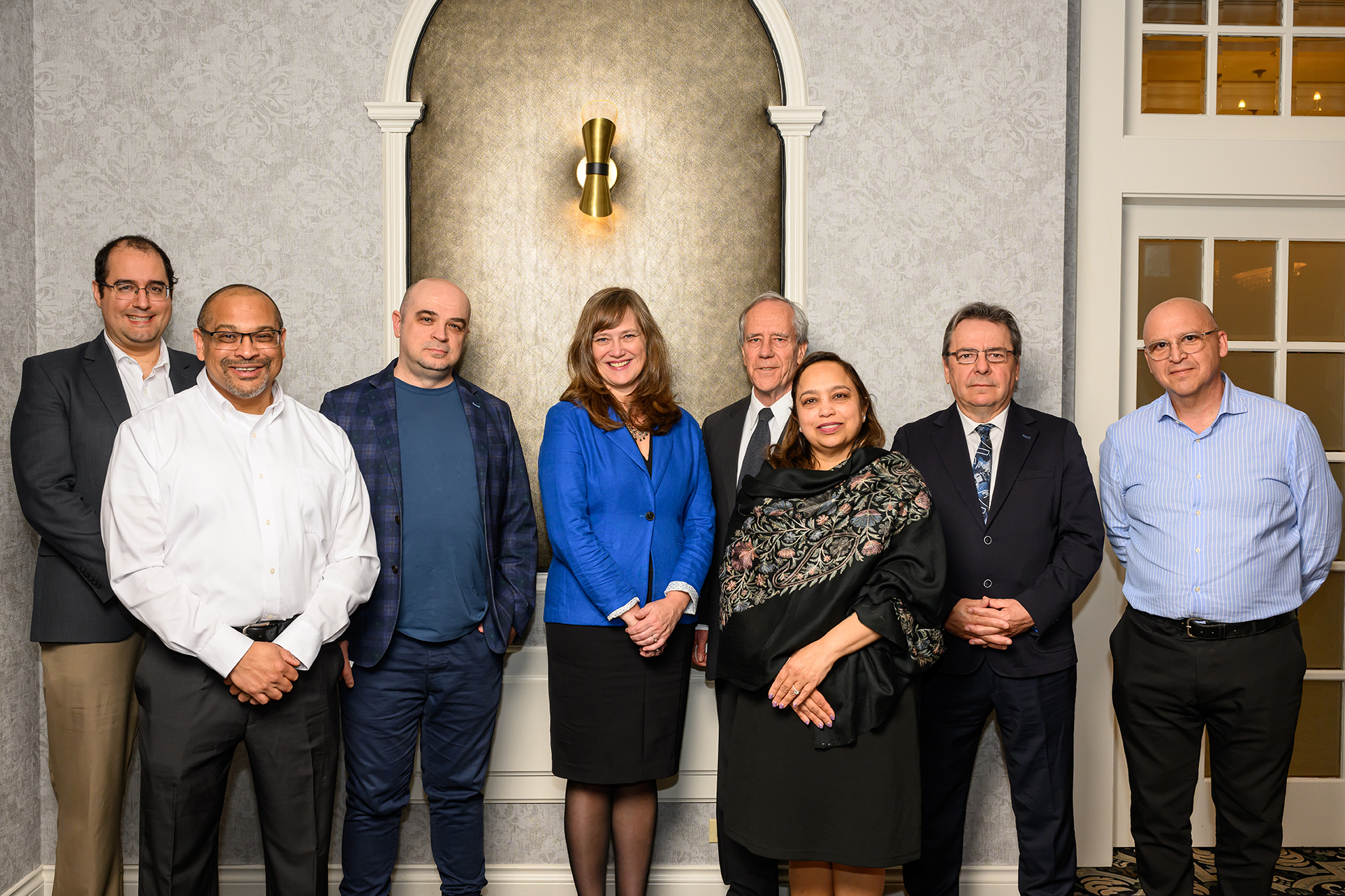In this edition:

The College’s 2024 Fraud Prevention Month Campaign Raises Awareness About the Importance of Using the Public Register
On March 1, the College launched a multilingual social media campaign with a straightforward message: If you choose to work with an immigration consultant for Canadian immigration matters, check our Public Register to verify that they are licensed by the College of Immigration and Citizenship Consultants.
As a member of the Fraud Prevention Forum, the College participates in Fraud Prevention Month each March to help consumers recognize, reject, and report fraud. For the College, our activities during Fraud Prevention Month are in accordance with our mandate to uphold and protect the immigration consulting profession in the public interest.
This year, the College’s campaign has focused on raising awareness about our Public Register, an essential tool for protecting the public from immigration fraud. The Public Register lists all licensed Regulated Canadian Immigration Consultants (RCICs) and Regulated International Student Immigration Advisors (RISIAs), whether in Canada or abroad.
The College has actively promoted the Public Register to consumers in Canada and internationally in India, China, Nigeria, and the Philippines - some of the top source countries of prospective immigrants to Canada. This year’s digital campaign includes social media posts and videos in French, English, Mandarin, and Hindi.
As we conclude Fraud Prevention Month 2024, we continue to encourage you to follow along and join the conversation!

The College’s Provincial Outreach Continues
The College continues to meet regularly with provincial stakeholders to raise awareness about our role as the regulator and to explore opportunities to work together to protect the public.
President & CEO John Murray, along with College staff, recently met with Hon. Malaya Marcelino, M.L.A., Manitoba’s Minister of Labour and Immigration and with representatives from the Ontario Immigrant Nominee Program (OINP) in Toronto earlier this month.
Collaborating closely with key stakeholders in the sector is an essential part of our work to protect the public and we look forward to continuing these important efforts.

Left to right: Board of Directors members Normand Beaudry, Tim D'Souza, Stanislav Belevici (Chair, Board of Directors), Jennifer Henry, Richard Dennis, Gagan Jot (Jyoti) Singh, Ben Rempel, and Marty Baram
Board of Directors Meeting Highlights – March 21, 2024
The College Board of Directors met on March 21, 2024. All directors attended either in person or via Zoom. Mr. Peter Christensen, Assistant Director, Admissibility, Immigration, Refugees and Citizenship Canada (IRCC) attended the meeting as Ministerial Observer pursuant to s. 76 of the College Act.
The Board of Directors approved the following item of interest to licensees:
- Amendments to the New-Licensee Mentoring Program Policy on the recommendation of the Governance and Nominating Committee (GNC) to provide clarity to licensees participating as mentors and mentees in future intakes of the Mentoring Program.
Other items before the Board of Directors included:
- An update on the progress toward achieving July 1, 2023 – June 30, 2026 Strategic Plan objectives,
- A discussion on the development of College By-Laws,
- A review of the Financial Results for Period ended December 31, 2023, and
- A presentation on College’s Fraud Prevention Month campaign encouraging members of the public to verify the status of licensees on the Public Register.
Full minutes of this Board meeting will be posted on the College website upon approval by the Board at its next meeting on June 20, 2024.
Note that College Board meetings are open to the public and licensees who wish to observe.
For more on our March Board Meeting and licensee networking event, visit the College’s LinkedIn page.

The New College Portal is Launching Soon!
We are pleased to announce that the new College Portal will launch on April 2, 2024!
The all-in-one platform will simplify your regulatory tasks. With a single sign-on to the College Portal, licensees can access their annual renewal, courses and programs, report CPD activities, make a complaint, pay their annual fees and more.
How to Pay Quarterly Invoices through the College Portal
Once you log in for the first time, you can access your quarterly invoices for licensing fees. Invoices will be delayed until April 2 so they can be accessed through the College Portal.
All automatic payments through FreshBooks will be disabled. The only way to pay your invoices will be by accessing them directly through your Dashboard in the College Portal.
If you have any questions or technical issues, please contact info@college-ic.ca.
For more information on the College Portal, visit: https://college-ic.ca/whats-on/college-portal.

New Guide for Developing Service Agreements
The Code of Professional Conduct (Code) requires that all RCICs must enter into a written service agreement with a client before any immigration or citizenship consulting services are provided. The College has created a new guide to help RCICs draft these service agreements. The new Guide for Developing Your Service Agreement (Guide) includes information on how to meet the mandatory requirements outlined in the Code.
The Code came into force in June of 2022 and imposes detailed requirements that licensees must meet when drafting service agreements. A substantial number of these requirements are new and were not required under the Retainer Agreement Regulation. The College has developed the Guide to help RCICs understand and comply with the new requirements.
The new Guide replaces the Retainer Agreement template. Many RCICs used the template without customizing it to fit the specific services that RCICs intended to provide clients. This led to client confusion and to client complaints about costs and services to be provided.
The new Guide is not a template and is not intended to be a one-size-fits-all document. It provides directions and guidance to support RCICs and allows for the addition of customized terms to service agreements. The new Guide is an evolving document and will be updated frequently. The College encourages RCICs to access it directly from the College website whenever necessary, instead of downloading and saving it for repeated use. Please note also that while the Guide for Developing Your Service Agreement replaces the Retainer Agreement template, the Retainer Agreement Regulation remains in effect until further notice.
We encourage RCICs to review the new Guide and invite them to join a focus group to provide feedback. Regular updates, driven by RCIC’s feedback, will ensure that the guide stays relevant and effective. RCICs interested in joining the focus group may send an expression of interest email (with a copy of their resume) to mshtemberg@college-ic.ca by April 1, 2024.

Tackling Immigration Fraud is a Shared Responsibility
The College’s Fraud Prevention Month campaign raises awareness about how prospective immigrants can protect themselves from immigration fraud. The campaign delivers a simple message – if you choose to work with an immigration consultant for Canadian immigration matters, check that they are licensed by the College on our Public Register.
Important organizations within the sector, including the Canadian Association of Professional Immigration Consultants (CAPIC) and Immigration, Refugees and Citizenship Canada (IRCC), have also recognized Fraud Prevention Month, sharing messages that warn about scams and the dangers posed by Unauthorized Practitioners (UAPs).
The complex, pervasive problem of UAPs is a multi-stakeholder issue and tackling the problem effectively requires collaboration. The College works with key stakeholders across Canada and internationally to better address this complex problem.
RCICs and RISIAs are also doing their part to grow public trust in the profession.
The Code of Professional Conduct is clear in its expectations of how licensees should conduct themselves and that they must “uphold the standards of the profession and perform their professional obligations honourably and with integrity.”
It also says that licensees “must not engage in conduct that is likely to discredit the profession or jeopardize the public’s confidence and trust in the profession.”
Section 44 (1.c) specifically adds that a “licensee who markets immigration or citizenship consulting services must ensure that the marketing is in the best interests of the public and is consistent with a high standard of professionalism.”
And the Code of Professional Conduct Interpretation Guide describes “being dishonest, committing fraud, breaching the client’s trust” as conduct unbecoming of a College licensee.
Examples of conduct that will erode public confidence or discredit the profession could include:
- Making promises or guarantees about the outcome of applications
- Suggesting that Canada’s immigration rules can be bent or overcome
- Hinting that Provincial language requirements can be avoided
- Making claims that you know you will be unable to deliver
The Code of Professional Conduct sets out the standards of professional conduct and competence that must be met by licensees, and the Code of Professional Conduct Interpretation Guide provides clarification and guidance, with reference to current best practices.
Both documents should be considered key tools for licensees in ensuring that their conduct in dealings with clients and in marketing their services on social media and elsewhere upholds the high standards of the profession.

The College’s Tribunal Committee is an independent adjudicative committee that hears and decides regulatory cases about licensees in accordance with the College’s core values of fairness, transparency, and public protection.
Below is a summary of the most recent decisions of the Tribunal Committee. Full decisions are available, without charge, on the Canadian Legal Information Institute’s (CanLII) website at:
https://www.canlii.org/en/ (please enter “ICCRC” or “College of Immigration and Citizenship Consultants” in the “Document text” field).
|
Discipline Committee Decision
|
|
Licensee
|
Carlito Manansala Benito |
|
Company Name/Location
|
Triple Maple Leaf Canada Corp.
Edmonton, Alberta |
|
Proceedings
|
Conduct, Sanctions and Costs |
|
Findings
|
The Disciplinary proceeding dealt with a complaint against the RCIC, and a finding of Professional Misconduct related to violating Articles 2.2.9(iii); 2.2.3(a)(iii); 2.2.3(b)(i); 2.2.3(b)(ii) and 7.1 of the 2016 RCIC Code of Professional Ethics.
The facts found by the Discipline Committee included that the RCIC:
• Plead guilty to the criminal offences of: 1) employing foreign nationals in a capacity they were not authorized under the Immigration and Refugee Protection Act (IRPA) to be employed, and 2) counselling persons to misrepresent or withhold material facts relating to a relevant matter that induces or could induce an error in the administration of IRPA.
• Hired and employed 8 foreign nationals without authorization to work in Canada and took advantage of their vulnerability to their detriment.
• Acted dishonestly, by breaching the trust of the employees, and by committing fraud.
• Counselled, induced, and aided clients to knowingly make false representations for study permit applications. |
| Outcome |
Permanent revocation of the licence; and a fine payable to the College in the amount of CAN$30,000.
|
|
Costs
|
RCIC is to pay costs to the College in the amount of CAN$7,400. |
|
Discipline Committee Decision
|
|
Licensee
|
Charles Benito
|
|
Company Name/Location
|
Helping Migrants Canadian Immigration Corp.
Edmonton, Alberta |
|
Proceedings
|
Conduct, Sanctions and Costs |
|
Findings
|
The Disciplinary proceeding dealt with a complaint against the RCIC, and a finding of Professional Misconduct related to violating Articles 2.2.9(iii); 2.2.3(a)(iii); 2.2.3(b)(i); 2.2.3(b)(ii) and 7.1 of the 2016 RCIC Code of Professional Ethics.
The facts found by the Discipline Committee included that the RCIC:
• Plead guilty and was convicted of the offence of employing foreign nationals in a capacity in which the foreign nationals were not authorized under the Immigration and Refugee Protection Act (IRPA) to be employed.
• Hired and employed 8 foreign nationals without authorization to work in Canada and took advantage of their vulnerability to their detriment.
|
| Outcome |
Permanent revocation of licence; and a fine payable to the College in the amount of CAN$15,000.
|
|
Costs
|
RCIC is to pay costs to the College in the amount of CAN$7,400. |
|
Discipline Committee Decision
|
|
Licensee
|
Hartar Singh Sohi |
|
Company Name/Location
|
Abroad Immigration and Education Services
Winnipeg, Manitoba
|
|
Proceedings
|
Conduct, Sanctions and Costs |
|
Findings
|
The Disciplinary proceeding dealt with 5 complaints against the RCIC, and a finding of Professional Misconduct related to violating Articles 2.2.3(a) and (b) 2.2.9(i); 3.1; 5;7; 8; 9.1; 11.1; 11.5.1 of the 2016 and 2019 RCIC Code of Professional Ethics.
The facts found by the Discipline Committee included that the RCIC:
• Failed to provide retainer agreements or receipts for substantial fees paid, most of which was paid in cash;
• Collected significant sums of money from complainants for services associated with obtaining a Labour Market Impact Assessment (LMIA), employment, and work permit, and applying for a Provincial Nominee Program (PNP) and permanent residence;
• Failed to render all services agreed upon with the complainants;
• Personally arranged employment with an employer that the complainants had no connection to, misrepresented the terms and conditions of the jobs that were presented, and allowed the company to exploit the complainants;
• Threatened complainants with immigration consequences if they raised concerns or pursued complaints regarding their exploitation or otherwise made efforts to deter complaints;
• Acted simultaneously for the employer and complainants when arranged for closed work permits with the employer, and defended the interests of the employer to the detriment of the complainants; and
• Transferred client files and communicated confidential information to another licensee, without the knowledge or consent of the complainants.
• Did not uphold RCIC’s obligations of communication with the College relating to complaints. The lack of response and participation in the complaint process suggest the RCIC is ungovernable. |
| Outcome |
Permanent revocation of licensee; a fine payable to the College in the amount of CAN$40,000 and restitution payable to clients in the aggregate amount of CAN$155,770.
|
|
Costs
|
RCIC is to pay costs to the College in the amount of CAN$67,729.80. |
|
Registrar Appeal Committee Decision
|
|
Appellant-Former Licensee
|
Fotso Guemin Jephté
|
|
Company Name/Location
|
CASCI
Montréal, Quebec |
|
Proceedings
|
Written Registrar Appeal Committee Hearing |
|
Findings
|
The Registrar Appeal Committee considered the Appellant’s appeal against a decision of the Registrar to revoke their licence for failure to pay the required annual licensing fees.
Other than filing a Notice of Appeal, the Appellant did not participate in the process and failed to provide disclosure. The Appellant did not attend a scheduled Case Management Conference and also did not comply with an extended deadline file disclosure. Accordingly, the appeal was considered abandoned and the Chairperson allowed the parties to make submissions on costs. |
| Outcome |
Appeal abandoned.
|
|
Costs
|
Costs in the amount of CAN $6393.67 are awarded to the College. |
|
Registrar Appeal Committee Decision
|
| Appellant-Former Licensee |
Zafar Mahmood |
|
Company Name/Location
|
ZM IMMIGRATION SERVICES INC.
Mississauga, Ontario |
|
Proceedings
|
Written Registrar Appeal Committee Hearing |
|
Findings
|
The Registrar Appeal Committee considered the Appellant’s appeal against a decision of the Registrar to revoke their licence for failure to pay the required annual licensing fees.
Other than filing the Notice of Appeal, the Appellant did not participate in the appeal process and failed to file evidence or submissions.
The committee concluded there was no error in the Registrar’s decision to revoke the Appellant’s licence. The Registrar followed the proper administrative process as set out in the By-law. There was no allegation or evidence of a breach of natural justice or procedural fairness with respect to the process; and the Appellant did not make any representations or provide any evidence to the Registrar. |
| Outcome |
Registrar’s decision is upheld, and the Appeal is dismissed. |
|
Costs
|
N/A |
|
Registrar Appeal Committee Decision
|
| Appellant-Former Licensee |
Chafik Moustaid |
|
Company Name/Location
|
ATL Immigration Canada
St-Léonard, Quebec |
|
Proceedings
|
Written Registrar Appeal Committee Hearing |
|
Findings
|
The Registrar Appeal Committee considered the Appellant’s appeal against a decision of the Registrar to revoke their licence for failure to pay the required annual licensing fees and the Registrar’s decision that the Appellant must meet the current educational requirements to be reinstated.
The committee concluded there was no error in the Registrar’s decision to revoke the Appellant’s licence. The Registrar followed the proper administrative process as set out in the By-law. There was no allegation or evidence of a breach of natural justice or procedural fairness with respect to the process.
The committee notes the Registrar’s letter sent to the Appellant sets out the process the Registrar uses in assessing an application for reinstatement. The letter instructed the Appellant to determine for themself whether they meet licensing requirements. The Appellant was provided an opportunity to present information on their educational qualifications but did not do so. The Registrar was not asked to and did not make a clear determination on whether the Applicant’s qualifications were adequate and the Registrar’s letter to the Appellant did not contain such a determination. Accordingly, and the committee deemed it premature for them to consider a ruling on this issue on appeal. |
| Outcome |
The Appeal is dismissed. |
|
Costs
|
Costs in the amount of CAN$7910 are awarded to the College. |

The College is looking for some talented professionals to join our team.
Do you or someone you know want to be part of a team that protects the public by overseeing regulated immigration and citizenship consultants and international student advisors?
Coordinator, Compliance
Coordinator, Entry-to-Practice (Bilingual)
Coordinator, Licensing Applications
Instructor (Bilingual)
Policy Analyst
Research Associate
Interested in any of these opportunities? Submit your resume and a brief cover letter indicating why you feel you are a fit for the role.
For more information on these positions and the most up-to-date College career postings, visit the College's Career page.
Career Opportunity at Queen’s University
The Faculty of Law at Queen’s University is accepting applications for several instructor positions. The instructors will teach courses in the Graduate Diploma Program in Immigration and Citizenship Law to be offered in the 2024-2025 academic year. The application deadline is April 30, 2024.
For more information visit Sessional Appointments | Queen's Law (queensu.ca).
Queen’s University offers the Graduate Diploma Program, the only English-language educational pathway for individuals who want to become Regulated Canadian Immigration Consultants (RCICs).